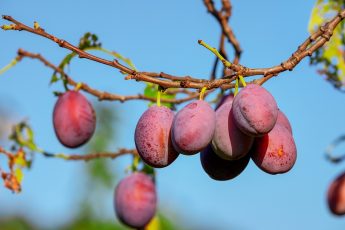Nutritionists and dieticians recommend that you eat brightly colored fruits and vegetables because the brighter they are, the more nutrient-dense they are. For instance, orange vegetables and fruits are high in beta-carotene, which is a nutrient that is excellent for your eyesight and has other healthy properties. What about purple fruits and vegetables? They are nutrient-dense, too, and the purple color comes from an essential nutrient known as anthocyanins. It is an antioxidant that helps to protect cells from free radicals since free radicals can damage cells and tissues.
You already know those purple vegetables such as radicchio and eggplant, even though that is technically a fruit. Now, let’s go over some names of purple fruits which are tasty and good for your cells and tissues!
Purple Fruit Names
Purple Grapes
You may think that purple grapes may be a thumbs down fruit because it has plenty of sugar. It may be a fruit with sugar, but it also has many nutrients that are beneficial for your health, including anthocyanins.
These grapes have plenty of Vitamin C to help boost your immune system and Vitamin K which is good for your bone and blood health. Grapes have other essential nutrients such as Vitamin B6, riboflavin, thiamine, manganese, copper, potassium, and fiber.
Even though this fruit is high in carbs, it has plenty of antioxidants that can help protect against certain chronic illnesses, and cancer and be good for your blood pressure and cardiovascular health.
As counterintuitive as it sounds, purple grapes can help stave off diabetes even though it is a fruit that is high in carbs. However, the rich properties it has can help you more so its carb content can cause problems.
Plums
Plums are another superfruit that has high levels of anthocyanins which is why it is purple. In addition, the fruit contains high levels of Vitamin C, which can help with your immune system and general health.
Plums also contain high levels of phytochemicals which are good for your cardiovascular health and can also help reduce chronic inflammation. Additionally, it contains potassium which can help ward off other diseases such as hypertension and cardiovascular ailments.
If you eat a plum a day, you will lower your chances of developing diabetes, having a stroke later on in life, as well as diseases such as Alzheimer’s. Another excellent thing about plums is that they contain sugar alcohol known as sorbitol, a natural laxative.
That means if you eat a plum daily, you will have no issues regarding constipation whatsoever.
Prunes

The one fruit you will eat if you are struggling with constipation is a prune, and that is because this fruit has so much fiber and sorbitol that it acts as a natural laxative. Therefore, prunes will help relieve the constipation issue, and they also provide you with good digestion as it contains plenty of potassium.
Prunes are good for your blood pressure and cardiovascular health. In addition, vitamin A is good for your eyesight; Vitamin B6 and K, which is good for your tissues, blood, and bone health; and riboflavin and niacin, which have many other great benefits.
Another great thing that prunes can do for you is to help you lower your chances of having a stroke, heart attack, and diabetes, as it helps lower cholesterol and blood sugar levels. The amount of fiber in prunes can also help curb your appetite.
Therefore, if you purposely try to lose or maintain your weight, this is a good low-calorie and high-fiber snack to eat.
Figs
Figs are another purple fruit with plenty of antioxidants, vitamins, and other helpful nutrients that will keep you healthy. The fruit is excellent for your bones and tissues, as it contains a lot of calcium and potassium, which is not only good for your bone health but it is good for your cardiovascular health.
In addition, it can help keep your blood pressure at a reasonable level. If you eat a fig a day, you have a chance to lower your odds of developing bone conditions such as osteoporosis, and can help improve your bone density.
Passion Fruit
Passion fruit is another purple fruit that is purple on the outside but has yellow flesh, and it contains sweet and sour seeds. This fruit has plenty of powerful nutrients, including antioxidants and phytonutrients, including Vitamins A and C.
Therefore, this fruit is good for your eye health and immune health, as well as your blood pressure and cardiovascular system. Therefore, when you are shopping for fruits, don’t forget to pick up some passion fruit as they are pretty good for you.
Many Types Of Berries
Many berries are purple, which includes blueberries (yes, they are bluish-purple even though they are called blueberries), acai berries, elderberries, blackberries (they are purple), as well as black currants.
These purple berries have one thing in common: they are full of potent antioxidants and essential vitamins and minerals to keep you healthy and strong.
At one time, black currants were banned in the USA because they believed that they spread a type of fungus. However, after discovering that was not the case, these purple fruits are eaten and enjoyed by many.
Want to find out more about vegetables and fruits, check out HERE.
Conclusion
Do you see one thing in common with all of these purple fruits? They have plenty of antioxidants, and there is one in particular that they have, which is anthocyanins. So that means purple fruits are good for your tissues, blood, bone health, blood sugar levels, cardiovascular health, and blood pressure.
So you can already see that they are good for you and quite tasty too. So, therefore, the next time you have a sweet craving, grab some purple berries, a plum, or some purple grapes. They are sweet and healthy too.
Your health will thank you for eating those purple fruits! Find out more about gardening on our website HERE.


